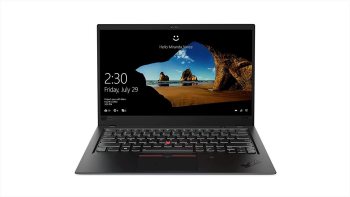- Excellent performance
- Beautiful display
- High-quality build
- Great battery life
- Reliable performance
- Durable build
- Excellent keyboard
- Bright and accurate display
- Premium price
- Limited upgrade options
- Higher cost
- Non-user upgradeable RAM
Dell XPS 13 Developer Edition vs Lenovo ThinkPad X1 Carbon
The Dell XPS 13 Developer Edition and Lenovo ThinkPad X1 Carbon are two highly-regarded linux laptops that cater to the needs of developers, programmers, and power users. Both devices have gained popularity in recent years due to their exceptional performance, sleek designs, and robust feature sets. In this comparison, we'll delve into the details of each laptop, highlighting their strengths and weaknesses to help you decide which one is best suited for your needs.
Design and Build Quality
The Dell XPS 13 Developer Edition boasts a stunning InfinityEdge display, with a slim bezel that provides an immersive viewing experience. The laptop's chassis is made from a combination of aluminum and carbon fiber, resulting in a durable and lightweight design that weighs just 2.7 pounds. In contrast, the Lenovo ThinkPad X1 Carbon features a more traditional ThinkPad design, with a matte black finish and a slightly thicker build. While it may not be as sleek as the XPS 13, the X1 Carbon's construction is still exceptionally robust, with a weight of just 2.4 pounds.
Performance
Both laptops are equipped with powerful processors, but they differ in terms of their CPU and memory configurations. The Dell XPS 13 Developer Edition comes with up to an Intel Core i7-10510U processor, paired with up to 64GB of RAM and a 2TB SSD. This makes it an excellent choice for demanding tasks like software development, video editing, and data analysis. The Lenovo ThinkPad X1 Carbon, on the other hand, offers up to an Intel Core i7-10610U processor, along with up to 16GB of RAM and a 1TB SSD. While it may not match the XPS 13's raw processing power, the X1 Carbon's more efficient CPU and optimized cooling system ensure that it remains cool and quiet even during intense workloads.
Linux Compatibility
As linux laptops, both devices have been certified to run various Linux distributions, including Ubuntu, Fedora, and openSUSE. The Dell XPS 13 Developer Edition comes with Ubuntu 20.04 LTS pre-installed, providing a seamless out-of-the-box experience for developers who prefer a Linux environment. The Lenovo ThinkPad X1 Carbon also supports multiple Linux distributions, although it may require more manual configuration to get up and running.
Display and Graphics
The Dell XPS 13 Developer Edition features a gorgeous 13.4-inch FHD (1920x1080) or 4K (3840x2160) display, with vibrant colors and excellent brightness. The laptop's Intel UHD Graphics 620 GPU provides decent graphics performance, although it may struggle with demanding games or graphics-intensive applications. In contrast, the Lenovo ThinkPad X1 Carbon offers a 14-inch FHD (1920x1080) or 4K (3840x2160) display, along with an integrated Intel UHD Graphics 620 GPU. While its display is not as visually stunning as the XPS 13's, the X1 Carbon's graphics performance is still more than sufficient for general productivity and office work.
Battery Life
The Lenovo ThinkPad X1 Carbon has a clear advantage when it comes to battery life, with up to 15 hours of runtime on a single charge. The Dell XPS 13 Developer Edition, on the other hand, offers around 10-12 hours of battery life, depending on usage patterns and screen brightness.
Ports and Connectivity
Both laptops have a limited selection of ports, but they differ in terms of their specific configurations. The Dell XPS 13 Developer Edition features two Thunderbolt 3 (USB-C) ports, one USB-A port, and an SD card reader. The Lenovo ThinkPad X1 Carbon, meanwhile, offers two Thunderbolt 3 (USB-C) ports, two USB-A ports, an HDMI port, and an Ethernet extension connector.
Conclusion
In conclusion, the Dell XPS 13 Developer Edition and Lenovo ThinkPad X1 Carbon are both exceptional linux laptops that cater to different needs and preferences. The XPS 13 is ideal for developers who require raw processing power, a stunning display, and a sleek design. The X1 Carbon, on the other hand, is better suited for business users who prioritize battery life, durability, and a more traditional ThinkPad experience. Ultimately, the choice between these two laptops will depend on your specific requirements and priorities. If you're in the market for a powerful and stylish linux laptop, the Dell XPS 13 Developer Edition is an excellent choice. However, if you prefer a more practical and long-lasting device with exceptional battery life, the Lenovo ThinkPad X1 Carbon is definitely worth considering.






























